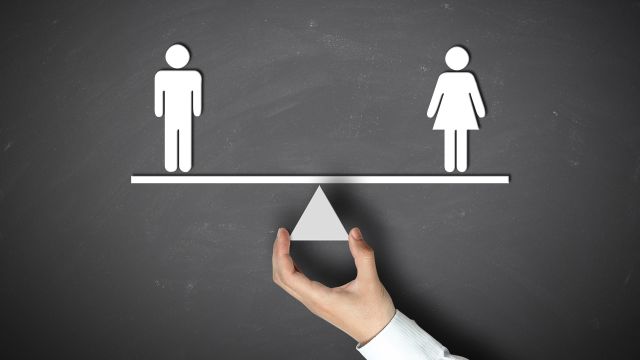At first, the formula for weight loss seems simple: burn more calories than you consume. It’s more complex than it initially appears, though. As we grow older, lean muscle mass is replaced with fat, our metabolisms slow and hormone levels change, making it more difficult to drop excess pounds. And of course, activity levels and diet play significant roles, as well.
But there's another factor we don't often discuss when it comes to slimming down: gender.
“There is a structural difference between men and women—women have more fat mass, while men have more lean tissue mass,” says Harish Kakkilaya, MD, a bariatric surgeon with Lourdes Health System. “It plays a role in the initial part of the weight loss." However, a man’s ability to shed weight quickly is often short-lived.
What’s gender got to do with it?
By nature, women typically have more fat than men, while men usually have more lean muscle mass. So, what does this mean for weight loss? Generally speaking, there is a link between a person’s body composition—the amount of fat compared to the amount of muscle mass—and resting metabolic rate. The body, even at rest, requires energy. The rate at which your body uses this energy, and burns calories, is known as a resting metabolic rate. Studies suggest men typically have a higher resting metabolic rate than women.
Body size and composition affect metabolism, as well, making people with a larger build and those with more muscle mass—like men—more likely to burn calories than their smaller and less muscular counterparts.
“Men have more lean tissue mass, so they burn calories quickly,” Kakkilaya says. “When you start losing weight, at first, men lose quickly,” he adds.
According to Kakkilaya, there’s another reason men may lose weight more rapidly than women at first: their fat tissue responds quicker to interventions, like bariatric surgery.
“During weight loss surgery, we found that the fat tissue in men is more sensitive, so they lose weight faster than women,” Kakkilaya says. “It may be the same mechanism when men lose weight with diet and exercise,” he adds.
But, how long does it last? Although men may initially slim down more rapidly, the advantage doesn’t last. “Women catch up. When you look at six months or one year into weight loss, there's no difference,” Kakkilaya says.
When gender doesn’t matter
While resting metabolic rate affects the number of calories a person is able to burn, it’s not the only factor. Diet and exercise play a major role in long-term weight loss. “To lose weight, it's the same process,” Kakkilaya says. “Both men and women have to change their diets and exercise or get weight loss surgery,” he adds.
Diet: A healthy diet is paramount to weight loss, and some research suggests it’s even more important than exercise, since cutting calories is easier than burning them off at the gym. If you’re looking to shed unwanted weight, manage your portions and choose wholesome foods, like fresh produce, lean protein, whole grains and healthy fats. “Your diet should be based on protein and fiber,” Kakkilaya says. “Eat a good amount of protein, like fish, chicken and legumes, and fiber from vegetables." Kakkilaya also recommends limiting carbohydrates and cutting sugar from your diet.
Logging your food and beverage consumption is one way to help keep your diet on track. Jot down your daily intake on a piece of paper or download a phone application, like Sharecare, available for iOS and Android. How it works: Simply open the app and plug in the size and quality of your meals.
Exercise: Increasing your activity level ups the number of calories you burn on a given day. Reducing the amount of time you spend sitting and adding more movement to your daily routine are simple and effective ways to burn some extra calories. Healthy adults should aim for at least 30 minutes of moderate-intensity exercise five times a week. The more weight you’re looking to lose, the more calories you’ll need to burn.
Surgery: Diet and exercise may not work for everyone. If you’re struggling to slim down, speak with your doctor about bariatric surgery. Be warned, weight loss surgery isn’t for everyone—likely candidates often have a body mass index in the obesity range, and obesity-related health problems.
Over the last decade, these procedures have shown promise for long-lasting weight loss. “With surgery, people lose weight and keep it off,” Kakkilaya says. “Compared to diet and exercise, weight loss surgery gives a much better chance of losing weight and maintaining that weight loss.”
Losing weight is important. Excess weight—obesity especially—can raise your risks for myriad health concerns like diabetes, hypertension, arthritis, sleep apnea, heart disease and even cancer.
“It's so important for some people to lose weight, to live longer, healthier lives and improve their quality of life,” Kakkilaya says. “But, I don't think there is such a big difference between what men and women should do to lose weight."






